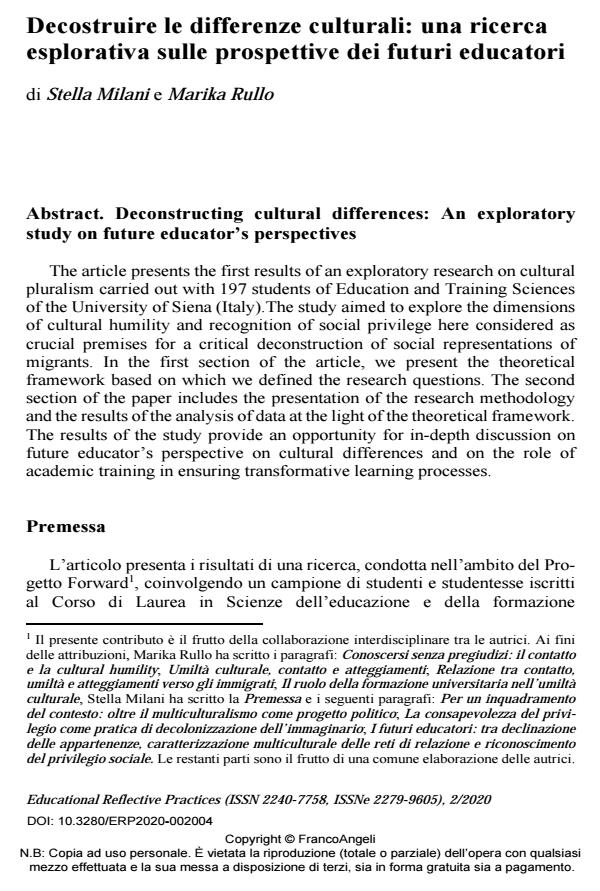Decostruire le differenze culturali: una ricerca esplorativa sulle prospettive dei futuri educatori
Titolo Rivista EDUCATIONAL REFLECTIVE PRACTICES
Autori/Curatori Stella Milani, Marika Rullo
Anno di pubblicazione 2021 Fascicolo 2020/2
Lingua Italiano Numero pagine 25 P. 86-110 Dimensione file 380 KB
DOI 10.3280/ERP2020-002004
Il DOI è il codice a barre della proprietà intellettuale: per saperne di più
clicca qui
Qui sotto puoi vedere in anteprima la prima pagina di questo articolo.
Se questo articolo ti interessa, lo puoi acquistare (e scaricare in formato pdf) seguendo le facili indicazioni per acquistare il download credit. Acquista Download Credits per scaricare questo Articolo in formato PDF

FrancoAngeli è membro della Publishers International Linking Association, Inc (PILA), associazione indipendente e non profit per facilitare (attraverso i servizi tecnologici implementati da CrossRef.org) l’accesso degli studiosi ai contenuti digitali nelle pubblicazioni professionali e scientifiche.
The article presents the first results of an exploratory research on cultural pluralism carried out with 197 students of Education and Training Sciences of the University of Siena (Italy).The study aimed to explore the dimensions of cultural humility and recognition of social privilege here considered as crucial premises for a critical deconstruction of social representations of migrants. In the first section of the article, we present the theoretical framework based on which we defined the research questions. The second section of the paper includes the presentation of the research methodology and the results of the analysis of data at the light of the theoretical framework. The results of the study provide an opportunity for in-depth discussion on future educator’s perspective on cultural differences and on the role of academic training in ensuring transformative learning processes.
- Evaluation of Studies on Cultural Humility in Terms of Various Parameters Onur Güleryüz, Gökmen Güneş, Bahadır Kılcan, in Anemon Muş Alparslan Üniversitesi Sosyal Bilimler Dergisi /2025 pp.1654
DOI: 10.18506/anemon.1688871
Stella Milani, Marika Rullo, Decostruire le differenze culturali: una ricerca esplorativa sulle prospettive dei futuri educatori in "EDUCATIONAL REFLECTIVE PRACTICES" 2/2020, pp 86-110, DOI: 10.3280/ERP2020-002004